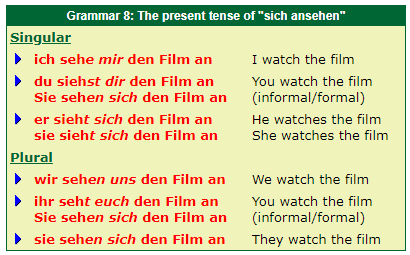Other reflexive verbs taking a dative pronoun
We have already seen in Chapter 7 that a number of German verbs such as sagen, geben and empfehlen take both a dative and an accusative object. The dative object is usually a person wheras the accusative object is usually a thing.
The same construction is found with certain reflexive verbs. The reflexive pronoun, which is an integral part of the verb, is in the dative case, but the verb also has an accusative object. Here is a list of such verbs which we have encountered in this chapter.

Notes
1. All of these four verbs happen to be separable. This by no means always true of verbs taking a reflexive pronoun in the dative case!
2. To use these verbs, replac etwas (= something) with an appropriate noun in the accusative case. For example:
Ich höre mir die Wettervorhersage an. (I'm listening to the weather forecast.)
Wir sehen uns die Quizshow an. (We're watching the quiz show)
Du leihst dir das Video aus. (You borrow the video.)
Das kann ich mir vorstellen. (I can imagine that.)
The complete present tense of "sich ansehen" with an accusative noun is thus as follows:

 英语
英语 日语
日语 韩语
韩语 法语
法语 西班牙语
西班牙语 意大利语
意大利语 阿拉伯语
阿拉伯语 葡萄牙语
葡萄牙语 越南语
越南语 俄语
俄语 芬兰语
芬兰语 泰语
泰语 丹麦语
丹麦语 对外汉语
对外汉语

